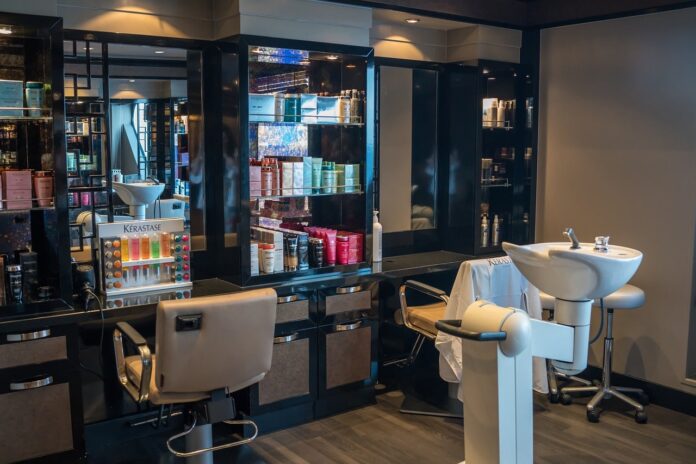- More than 11,000[1] UK beauty, hair salons and spas are financially struggling, with 40% of their costs going towards energy bills[2]
- Almost a third (32%) have raised their prices in response to the rising cost of energy[3]
- Uswitch estimates that salons which are out of contract on their energy bill (on a deemed rate contract) could be paying up to 50% more than those on a negotiated deal[4]
- Two in five (40%) customers are choosing less expensive treatments, leaving longer intervals between visits (35%) and leaving lower tips (29%)[5] as they cut back on in-salon spending
- Uswitch for Business energy expert, Jack Arthur, provides top tips for salon owners on how to avoid overpaying on business energy
Energy bills make up 40% of the average hair and beauty salon’s total business costs[2], according to a new survey of decision makers by Uswitch for Business, the business energy comparison and switching service.
Energy bills are the top concern for salons and spas, more so than rent costs, product inflation and attracting new customers[6]. 24% of salon business owners say they are struggling to pay the energy costs associated with running their businesses.
As a result, four in 10 of those salon decision makers (40%) feel anxious about their business, while one in five (20%) have had to ask family and friends to help cover business costs[7].
In response to these challenges, almost a third of salons (32%) have had to increase prices[3]. Some are also taking other precautions such as turning off, down or restricting air-conditioning or heating (32%), training all staff in energy efficient measures (31%) and investing in more energy efficient appliances (27%)[3].
With inflation expected to remain high, Uswitch for Business estimates that salons who have fallen out of contract could be paying up to 50% more than those on a negotiated deal.
If costs continue to rise, decision makers will need to consider more ways to manage cash flow to avoid having to close their business. More than two in five (44%) said they may have to reduce the number of services on offer, and almost one in three (29%) may also have to downsize or close down sites (28%)[8].
Some salons have already had to let staff go or reduce shifts (18%). Others have seen employees leave for better paying roles (25%) and have opted to reduce business hours (21%)[5].
As the cost of living continues to rise, salons have noticed that customers are selecting cheaper treatments (40%), leaving longer intervals between appointments (35%), giving lower tips (29%) and coming in for hair treatments with wet hair to save costs (18%)[5].
Overall, consumers are making cost cutting decisions where they can, with a third of owners (33%) seeing fewer appointments booked now compared to last year[9].
Jack Arthur, energy expert at Uswitch for Business comments: “The hair and beauty industry is an essential part of the UK economy, providing jobs and services to millions. However, reduced footfall and sky-high energy costs puts salon and spa owners in a really difficult position.
“Business decision makers should make sure they are aware of the terms and end date of their current energy contract so they can shop around for the best rates at the time of renewal.
“If salon owners have concerns about paying their bills or if they aren’t receiving the right level of support, they should contact their energy supplier as soon as possible.”
Paul Faulkner, owner of The Retreat Hairdressing in Wisbech, Cambridgeshire said: “The rising cost of energy is a major issue for my business. We need to continue to provide the best possible service for customers without having to raise prices, but it is unfortunately becoming more and more difficult.”
“As a business owner I am constantly looking at ways to keep costs as low as possible whilst continuing to offer the services my customers want. We are always reviewing costs and staying energy cautious by taking steps including turning off or down heating and air conditioning and having flexible business hours.
“Whilst we can be creative in how we operate, the cost of energy is hitting the beauty industry hard with many salons feeling the pressure or closing altogether.”
Top tips from Jack Arthur, energy expert at Uswitch for Business on how to avoid overpaying on business energy costs:
1. Check all your contracts – both gas and electricity
Dual fuel agreements do not exist in the business market, which means that you will likely have different arrangements for your gas and electricity. Make sure you’ve got the details of both contracts, including your current supplier and take note of the contract types, duration and end dates.
2. Identify your ‘switching window’
The ‘switching window’ is the period where you can change to a cheaper deal if you’re on a contract you’ve not chosen, your tariff has expired or if you’ve taken over a new premises.
3. Seek expert advice when it comes to finding a competitive energy deal
Finding the right deal for your business can take time, so if you are struggling to understand the type of contract needed for your firm and its usage, consider speaking to an energy broker. Sites like Uswitch for Business can help you during your search.
4. If you’re struggling to pay your bills, speak to your supplier ASAP
Contact your supplier as soon as you can if you are worried about paying your business energy bills. Suppliers may be able to work with you to agree a payment plan you can afford more easily.
5. Understand how to improve your businesses energy efficiency
You can make a difference to your overall consumption by considering energy efficient measures, such as energy saving lighting, as well as turning off other technology when not in use. If you don’t have one already, consider installing a smart meter or a half hourly meter to understand where you are wasting energy and to improve the accuracy of your bills.
Help keep news FREE for our readers
Supporting your local community newspaper/online news outlet is crucial now more than ever. If you believe in independent journalism, then consider making a valuable contribution by making a one-time or monthly donation. We operate in rural areas where providing unbiased news can be challenging. Read More About Supporting The West Wales Chronicle


























